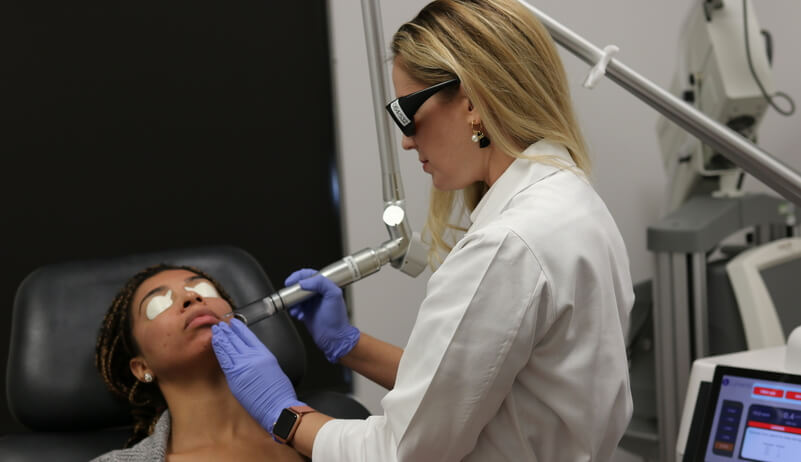Understanding Cosmetic Laser Treatment Safety Laws

When studying the laws and regulations in the United States governing laser operation, it is clear there is a lack of clearly defined rules in most states. Each state has a different set of rules and many of the guidelines are vague and complex. With the increase in the number of cosmetic laser procedures performed, the laws and regulations continue to change. The information can generally be found from numerous resources including state cosmetology boards, state legislative boards, state nursing boards, and state medical boards. It is important to also recognize these laws and regulations are constantly changing and the information in this article may not be completely accurate after a certain time.
LASER HAIR REMOVAL
Laser hair removal is considered a separate procedure in many states. Laser hair removal does not necessarily require the use of a laser device and can be performed with use of an Intense Pulsed Light (IPL) device, which further complicates the understanding of these regulations. IPL devices in general have less regulation surrounding their operators. This article does not address use of IPL devices and only addresses the use of laser devices. Laser hair removal is also the most common procedure to result in patient injury and litigation. This is interesting because laser hair removal is also the least regulated procedure.
UNDERSTANDING THE LAWS
The best way to divide and understand the laws and regulations of laser operation is by consideration of three categories: delegation, supervision, and operation. Delegation is defined by who can delegate a laser procedure to another individual. Supervision is defined by describing which procedures require supervision and who is qualified to supervise. Operation of a laser for the purposes of this article is simply who is allowed to fire a laser. The variables display significant overlap and this can be confusing.
Most state laws and regulations allow only physicians to delegate laser procedures. However, an important caveat to this is that physicians can be classified as those with degrees in dental medicine, osteopathic medicine, optometry, podiatry, naturopathic medicine or others and are not limited to those with a doctor of medicine. Fewer states allow laser procedures to be delegated by non-physicians and even fewer allow laser procedures to be performed independently. “New Jersey is the only state that exclusively limits the operation of a laser to licensed physicians by excluding laser and light devices in procedures that can be delegated to licensed or unlicensed persons.”1
A select few states have no searchable information regarding regulations, guidance, statues, or laws on the operation of laser and energy-based devices. These states are: Missouri, New York, Nevada (only comments on lasers on the eye), Pennsylvania, Virginia (only information on laser hair removal), Wisconsin, and Wyoming.
Most states consider operation of a laser device as “the practice of medicine.”
LASER LAWS IN TEXAS
Here in Texas, laser procedures are considered to be “the practice of medicine.” Laser procedures can be delegated by physicians, do not require supervision or physician oversight during the procedure, and can be performed by anyone that has received “appropriate training.” However, in Texas it is required, pursuant to Texas Administrative Code Section 193.17, that a patient first be seen by a physician, physician assistant, or nurse practitioner to receive a pre-operative assessment prior to a laser treatment (laser hair removal is exempted) performed by any other type of service provider.
CHOOSE YOUR LASER PROVIDER CAREFULLY
It is important for the patient to inquire the level of training of the individual performing his or her cosmetic laser procedure. Studies have demonstrated an increased risk of injury and increased litigation in procedures performed by non-physicians. Furthermore, dermatology is the only medical specialty that receives formal medical training for a minimum of 3 years in the use of lasers for cosmetic procedures and many dermatologists go on to continue their educational training in laser fellowship programs. Many non-dermatology medical offices or med spas are individuals or physicians that are untrained in performing laser procedures, but choose to offer cosmetic laser procedures in their practice because they are lucrative. At Westlake Dermatology, we frequently see patients who have had complications from cosmetic laser procedures performed by unqualified physicians at other medical offices practicing outside the scope of their training. It is the Wild West out there when it comes to cosmetic laser procedures and the consumer should be cautious in selecting a qualified provider or they may get burned.
Reference: DiGiorgio, CM, Avram, MM. Laws and regulations of laser operation in the United States. Lasers in Surgery and Medicine. 2018 Apr;50(4):272-279.

It’s great to know that y’all are staying up on safety. Coming in for resurfacing soon 🙂
Awesome! Thank you for this essential information.